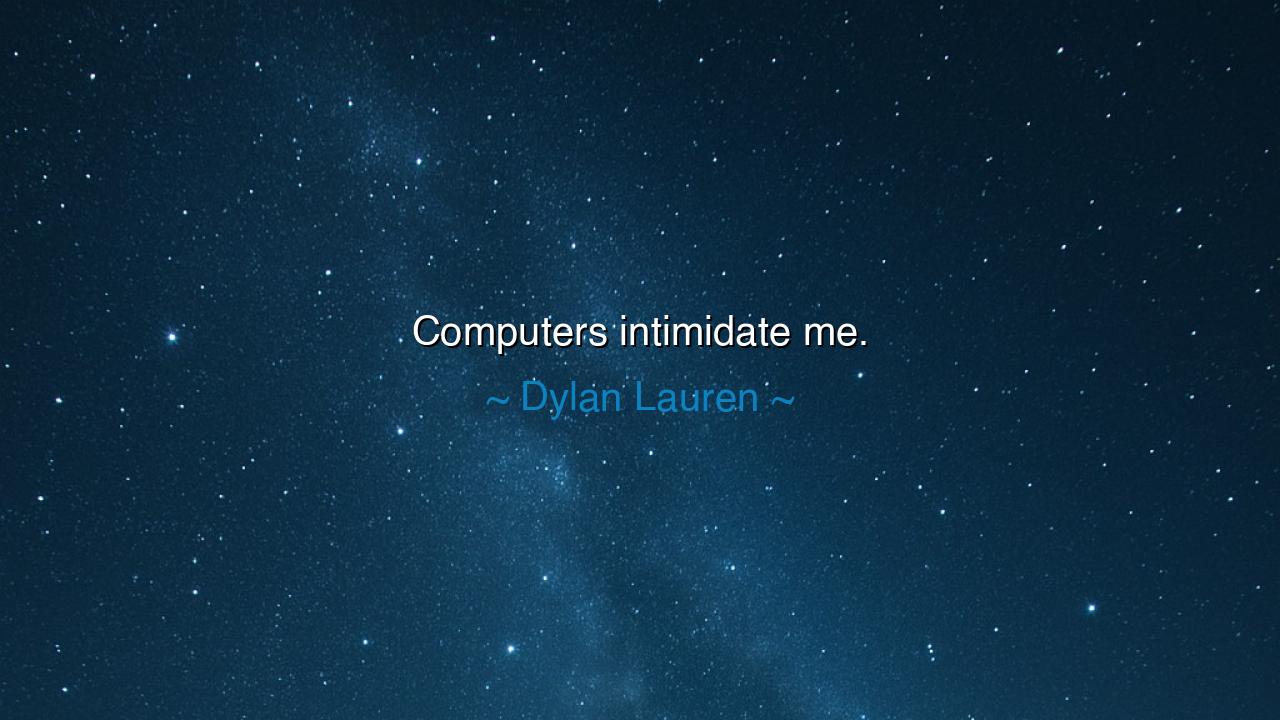
Computers intimidate me.






In the simple yet profound confession of Dylan Lauren, there is a truth that reaches far beyond technology: “Computers intimidate me.” Though brief, these words reveal not weakness, but humanity — the timeless struggle between creation and its creator, between humankind and the tools it forges. In every age, the new and unfamiliar have stirred both awe and unease. The sword once frightened the farmer, the printing press unsettled the scribe, and the steam engine overwhelmed those who had only known the horse. So too, in our age, the computer, that glowing mind of circuits and code, stands before many as a silent riddle — wondrous, powerful, yet intimidating.
To be intimidated by machines is not folly; it is instinct. Humanity, though the maker of tools, has always feared losing mastery over them. When Dylan Lauren — daughter of creativity, founder of color and sweetness — admits her fear, she speaks for millions who stand at the edge of the digital sea, unsure whether to step in. Her words are not of defiance, but of humility: an acknowledgment that even in an age of progress, the heart still trembles before the unknown. For while the computer extends human power, it also conceals its workings. It thinks in silence, in patterns of light invisible to our senses, and this very mystery is what awakens unease.
Long ago, in the ancient libraries of Alexandria, scholars faced a similar fear — not of machines, but of the written word itself. There were those who believed that writing would weaken memory, that by entrusting thought to parchment, humanity would lose its wisdom. Yet the scribes wrote on, and the world did not collapse; it expanded. Likewise, today, many who fear technology mistake it for a replacement of human power, when in truth, it is a mirror of it. What Lauren reveals is a universal tension: the heart’s longing to remain in control, to understand the forces it has unleashed.
Her words also carry an emotional resonance — for beneath fear lies admiration. To be intimidated by something is to recognize its magnitude, its potential to shape the world. The computer intimidates not because it is malevolent, but because it is vast — capable of storing the thoughts of generations, connecting distant souls, shaping economies and empires. The wise do not mock fear; they listen to it, for fear is the mind’s way of signaling that something immense stands before us. And in that realization lies the seed of transformation.
Think of Ada Lovelace, the daughter of a poet, who in the 19th century looked upon Charles Babbage’s mechanical engine and saw more than gears — she saw imagination. Where others saw machinery, she saw possibility: that numbers could sing, that computation could create art. If she had allowed intimidation to rule her, the dream of programming might never have been born. From her courage, we learn that mastery over fear does not come from denial, but from understanding — from turning curiosity into bridge and dread into discovery.
So, when Dylan Lauren says “Computers intimidate me,” she offers not defeat, but honesty — the first step toward wisdom. For every art begins with awe. Even the musician is intimidated by silence before composing their first note; the sculptor hesitates before the stone. In time, the unknown yields to practice, and fear becomes familiarity. The ancient masters knew this: courage is not the absence of fear, but the decision to face it.
The lesson, then, is clear: do not turn away from what intimidates you — approach it. Fear is the guardian of growth. The computer, the tool, the new creation — all are mirrors asking us to evolve. Begin as the ancients did: with reverence, patience, and curiosity. Touch the machine, ask it to teach you, and in return, offer your imagination. For the one who dares to learn transforms fear into mastery, and intimidation into empowerment.
Thus, let the words of Dylan Lauren be both warning and invitation: do not let fear of the unknown silence your spirit. Whether your “computer” is a literal device, or any challenge that feels beyond your reach, face it with humility and resolve. For in learning what once intimidated you, you awaken the greater truth — that the world’s power lies not in its machines, but in the human heart brave enough to understand them.






AAdministratorAdministrator
Welcome, honored guests. Please leave a comment, we will respond soon